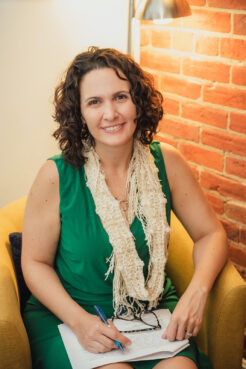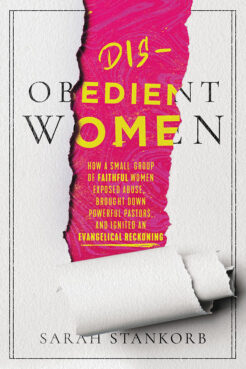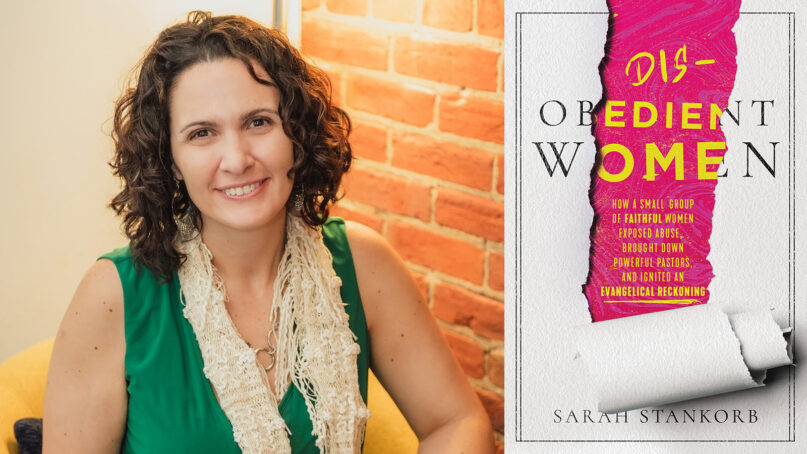(RNS) — When girls and women are taught that submitting to men without question is what God designed them to do, men have few checks on their power. Too often, evangelical pastors and other powerful men took advantage of that, abusing women sexually and emotionally — and then either blaming the survivors or castigating their credibility when survivors sounded the alarm.
Sarah Stankorb’s powerful new book, “Disobedient Women: How a Small Group of Faithful Women Exposed Abuse, Brought Down Powerful Pastors, and Ignited an Evangelical Reckoning,” tells the stories of those survivors and the advocates who spoke up for them. Years before #churchtoo became a hashtag, Stankorb was researching and writing about sexual abuse for publications like Washington Post Magazine, Cosmopolitan and Marie Claire. This interview has been edited for length and clarity.
How did you start on this quest?
Beginning the research and discovering Christian patriarchy started with one story. Many years ago, someone pointed me to a really interesting crowdfunding effort. That was Vyckie Garrison, who had been in a Quiverfull environment, and she had many children. She was leaving both her husband and her church, she didn’t have the funds she needed to support such a large family, and she was just about to be named 2014 Atheist of the Year. I didn’t know what the word Quiverfull even meant, but I looked it up and read her blog. That opened the door.
In case readers don’t know what Quiverfull is, could you explain its teachings and its popularity?
It’s a philosophy of reproduction that treats the womb and what the womb can produce as God’s blessing. So if you use birth control or your husband has a vasectomy, you’re blocking God’s blessing. So the more children you have, the more blessings you have. It comes with a lot of assurances that you’ll be able to support all of these children.
Underlying a lot of it is this idea that Christians need to reproduce as much as possible to keep the Christian population large and overtake other populations of believers. Also baked in, which was very important in Vyckie’s case, was this idea of martyrdom — that as a woman, your way of creating Christians in the world is through procreation. And even if you die in the process, then that’s a way of becoming a martyr.
You also talk about the idea of the stay-at-home daughter, which was a movement I had not heard of before.

Sarah Stankorb, author of “Disobedient Women.” Photo by Helen McCormick Photography
It’s encouraging girls to stay home within their family, under the authority of their father, training to be a mother. It also resulted in girls helping their very overwhelmed mothers with homemaking and raising younger siblings. In these families you really shouldn’t go off to college; college and universities are where you learn feminism and Marxism.
So having a stay-at-home daughter is a way of keeping these young adult women in an authoritative situation until they enter a courtship that’s parent-approved, where they can marry a young man and move under that man’s authority. It was a stopgap to discourage young women from learning any other worldview than what they were raised with. But it also really just reinforced that idea of male authority.
Many Americans were introduced to this idea of courtship through the Duggar family. You spend some time on them in the book. In what way did the Duggar children’s upbringing facilitate the abuse that Josh perpetrated on his sisters, and then how that abuse was handled?
One of the ways is that once the family knew about the abuse, instead of doing what many families would do, which is to seek someone licensed in therapy to walk those young women through a difficult process, Josh was sent to a training center run by Bill Gothard and the IBLP (Institute for Basic Life Principles). That’s where Gothard’s ministry took in many young people for misbehavior and bucking authority. But here we’re talking about sexual assault; we’re talking about a crime. And it was not treated that way.
But the Duggars served as the poster children for Bill Gothard’s ministry, for this whole way of life. And like you saw in the documentary “Shiny Happy People,” shiny people have a few flaws, and it was not all as pleasant as it was shown on reality TV. Many of these families, including not just the Duggars but others who were not as well known, had to maintain a certain credibility within their religious subculture, which meant trying their best not to show the ugly side of life. If you show anything negative, you’ll lose status within the ministry. I think that was also likely a part of why the Duggars didn’t come forward about the abuse, because they didn’t go public until forced to.
Your book does an excellent job of trying to understand this subculture in a deep way rather than just critiquing it. What might women find attractive about this lifestyle that is fairly closed, with clearly defined gender roles? What’s in it for the women who stay?
That’s a great question. Many families enter this worldview through home schooling. Sometimes they start home schooling for a religious reason, but maybe they just want to teach their kids themselves. They go to a conference and learn that keeping children at home is best if they want to be godly, whatever that means to them. There’s plenty of material that infuses these ideas in their curriculum. It requires a heck of a lot of sacrifice, but they’re willing to do it because they want it to be good in the eyes of God.
I’ll also say I’ve heard from more than a few sources that the gendered power dynamics within their particular families were not as clear-cut as you would think on paper. Sometimes, it’s the women who are pushing the whole Christian patriarchy thing, when the mother is the one bringing the ideas home and almost forcing the father into it. And maybe those men are not naturally people who want that kind of absolute authority. When they feel like, “Well, I have to, this is what this minister I trust tells me I’m supposed to do,” it often becomes extreme. It’s almost as if they’re trying on personality traits that don’t belong to them. You have a woman trying to be submissive, but also trying to force her family members into these roles, and you have a man who feels obligated to be a certain kind of Christian leader. It becomes a mess of people trying to be things they’re not.
Many of these cases of abuse are situated in the rise of “purity culture” from roughly the 1970s to the early 2000s. Did purity culture contribute to abuse in evangelicalism?

“Disobedient Women: How a Small Group of Faithful Women Exposed Abuse, Brought Down Powerful Pastors, and Ignited an Evangelical Reckoning” by Sarah Stankorb. Courtesy image
I think purity culture definitely plays a role. There’s pressure for girls and boys both to avoid any sort of sexual contact, even front-to-front hugs, and to avoid kissing until marriage in the more extreme cases. But the responsibility falls primarily on the women and girls, not only to shield themselves from sin, but also to keep men or boys from even thinking about anything sexual.
Many of these girls haven’t had any information about sex. They don’t know what’s normal; they don’t know what’s healthy; they don’t know what consent is. That’s just not explained. Then when the abuse does happen, they feel so guilty because they feel like it’s their responsibility.
After that amount of guilt, you don’t typically step forward to say, “This is what happened to me.” Often, even if they do step forward within their churches, their pastors blame them. I’m thinking of someone like Jules Woodson, whose youth pastor assaulted her. He was also the person who taught her True Love Waits class. So when he got her alone and asked her to perform sex acts, she assumed that meant he wanted to marry her. That was the only context she had. The following day she reported to her church and was asked, “Did you participate?” Very clearly the blame fell to her. He was eventually sent off to another church. They had a wonderful going-away reception for him. The way Jules was treated was so awful that it almost destroyed her. There are so many stories.
Some of those stories were the multiple victims who came forward with accusations about Bill Gothard himself.
Yes. They thought they were alone until they saw another story on the internet from someone else who had been plucked out of the ministry and brought to work for Bill Gothard. These women describe being brought in alone with Bill Gothard, him putting his hands on them, him rubbing his feet on them, things that should not happen in a workplace or anywhere without permission. But most had no context for any of this. They felt uncomfortable, but he was such an important figure. He was as close to God as anyone they knew, and because of that, they could not fathom that he was being predatory. It wasn’t until they saw another person’s story online and then started to come forward one by one that they began to recognize it was a pattern.
It must have been difficult to spend so many years hearing story after story of abuse. Toward the end of the book you offer a useful distinction of being trauma-informed, but not trauma-absorptive. Can you explain that?
It’s vital for me to go into an interview reminding myself of what my role is. I’m to be a listener. I have to pay close attention to every moment they’ve described. I need to keep my mind a step outside. That way I can fact-check, I can say, “When exactly did that happen? Do you remember what time of day it was? What were you looking at?” If they mentioned something financial, I need to be thinking about whether they have paperwork to back up what they’ve told me. So, I focus on who else I might need to talk to and how best to verify their story.
That kind of dual mindfulness does keep me a layer out, but there are times when I’ll get to the end of the day and it’ll hit me that I’ve just talked to someone who’s been through something awful. I try my best not to absorb it because philosophically I know it’s not mine. It would be wrong for me to wear all of the pain of these people as if it’s my own.
Related RNS content:
For abuse survivors like Jules Woodson, the Indiana pastor video is all too familiar
To Baptist clergy abuse survivors: 10 tips from the trenches






